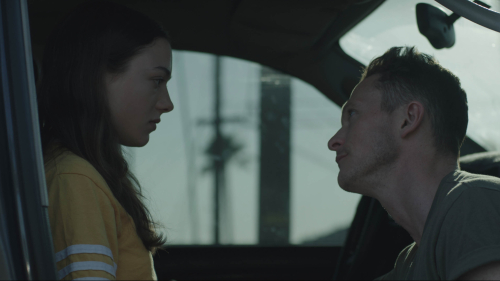
Sundance Institute
MOVIE REVIEW
Palm Trees and Power Lines (2022)
“Palm Trees and Power Lines” immediately joins the rare pantheon of movies that are so emotionally disturbing they can only be watched once. But earlier examples such as “Requiem for a Dream” and “Million Dollar Baby” are kiddie cartoons compared to the brutal nihilism and emotional horror within this film. In her first feature film, director Jamie Dack, who also wrote the script by Audrey Findlay, has immediately vaulted herself to the front rank of American directors, but she’s done it with a story so difficult to enjoy that she – and it – are not going to get the attention they deserve.
It’s a simple story, really. It’s summer, and there’s nothing for 17-year-old Lea (Lily McInerny) to do but watch make-up tutorials, scroll on her phone and sunbathe in the backyard with her best friend Amber (Quinn Frankel). She has no hobbies, no interests and no plans for the future waiting for her after high school. And she doesn’t know what to do about it. Her mother (Gretchen Mol) is preoccupied with her romantic misadventures, and her friends are not particularly nice. When the gang leaves a diner without paying, Lea is horrified and slow to follow, which means she’s the one grabbed and slapped by a line chef. One of the other patrons intervenes, Lea escapes and the patron insists on giving Lea a ride home. She accepts, sneakily delighted that this older man has been nice to her. His name is Tom (Jonathan Tucker), he is 34, and he offers his number to her, just in case.
The rest of the movie is a slow dance between a rabbit and a cobra, which the rabbit thinks is between two rabbits. Tom’s circling of Lea is deliberately designed to look like the beginning of a new relationship, and there’s such a lack of positive things in Lea’s life that she honestly thinks it is. They discuss absent fathers and disappointing mothers. They go to the beach and to watch planes land at the airport. Tom pays for everything and buys Lea a bracelet engraved with a joke she made at one of their earlier meetings. He is very careful to make sure everything that happens is Lea’s idea. And the overwhelming horror is that Lea is happy about all of it.
They go away for a few days – during which Lea’s mother doesn’t even call to check where she is – and what follows is one of the most incredibly disturbing sequences ever captured on film, all the more since it’s carefully shot in a way not to exploit Ms. McInerny. Ms. Dack’s direction, the cinematography by Chananun Chotrungroj and the editing by Christopher Radcliff shows Lea a consideration that she does not get in her life. It’s deliberate, and it’s so unbelievably distressing, both at what you’re watching and at how easy it is to watch. And the worst is yet to come. And that worst is really, really, really, really, really bad.
The acting is exceptional; the story is crushingly important; the lack of judgement shown to the characters is essential to drawing the audience in; it’s all thoughtfully done; and once it’s over it leaves one of the strongest emotional hangovers in recent memory. Parents need to show this to their sons, to teach them what not to be; and to their daughters, to teach them what to avoid at all cost. Young women need to watch this in order to choose how to build themselves up so they don’t fall into this trap, and young men need to watch this in order to learn both empathy and how not to be an abusive sack of shit. “Palm Trees and Power Lines” deserves the highest possible praise. And I’d rather drink bleach than watch it again.
Comments